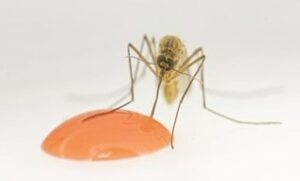
A Culex quinquefasciatus female feeding on the attractive targeted sugar bait suspension
Recent malaria infections in the U.S. have increased public awareness and concern about mosquito-borne illnesses, but around the world the threat from mosquitos is always present. In fact, because mosquitoes spread a number of organisms including dengue, Zika, yellow fever and West Nile virus in addition to malaria, they are among the deadliest animals on Earth.
The news gets even more grim as there is evidence that the mosquitoes responsible for spreading these diseases are developing resistance to chemical-based insecticides that have been used for decades.
Researchers in the Scheel Lab at the Indiana University School of Medicine-South Bend developed an innovative and environmentally friendly approach to control three types of mosquitoes responsible for the spread of these diseases. They recently received a grant from the Indiana Clinical and Translational Sciences Institute (CTSI) and IU Center for Global Health Equity to conduct studies with their colleagues at the Kenya Medical Research Institute (KEMRI) on the species responsible for the spread of malaria.
The two-year reciprocal innovation demonstration grant for $50,000 will evaluate the efficacy and suitability of an intervention that attracts the problem mosquitoes using a sugar bait and uses common baker’s yeast to deliver an RNA-based pesticide that interferes with mosquito survival. In lab testing, the species-specific pesticide was effective on larvae and adult Aedes (dengue, Zika and yellow fever vector), Culex (West Nile virus vector) and Anopheles mosquitos (malaria vector). Yeast has a strong odor and is highly attractive to both larvae and adult mosquitoes and the sugar baits are designed to take advantage of mosquito sugar-feeding behaviors to deliver the pesticide.
The reciprocal innovation grants fund research in shared priority areas for global partners and Indiana with innovations that can work in diverse settings around the globe. “In global health research, reciprocal innovation is a collaborative process to exchange lessons learned and co-develop technology and health innovations with mutual benefit to health partners in both low- and middle-income countries (LMIC) and the United States,” said Kara Wools-Kaloustian, MD, director of research for the IU Center for Global Health Equity. Investigators from the Indiana CTSI partner institutions (IU, Purdue and Notre Dame) lead the grants with collaborators from both the U.S. and their partners in LMIC.
For the study’s principal investigator, Teresia Njoroge, PhD, MS, the success of the intervention is important, not just professionally, but personally as well. “I worked in western Kenya, a region of very high malaria transmission. I was a victim of this dreaded disease multiple times,” said Njoroge, a postdoctoral research associate in medical and molecular genetics at IU School of Medicine-South Bend. “Because of this experience, I developed interest in understanding more about malaria including knowledge on the main vectors, how it is transmitted and how I could contribute to its control.”
Malaria is a leading cause of illness and death globally with 619,000 deaths occurring in 2021. The sub-Saharan African region is affected disproportionately carrying the highest disease burden (WHO, 2022) and in Kenya, approximately 70 percent of the population is at risk for the deadly disease. In the continental U.S., West Nile virus remains a public health problem with frequent outbreaks of dengue and Zika virus in U.S. states and territories (CDC, 2020).
The study will be conducted in semi-field structures resembling large tents at the core facility of KEMRI in Kisumu, Kenya. Part of the study will test how attractive the yeast RNA-based insecticides are to the Anopheles mosquitoes in comparison to flowers of the region. Additionally, mosquitoes will be released and recaptured in field studies to assess the suitability of the yeast delivered pesticide in a field setting.
Co-principal investigator, Eric Odhiambo Ochomo, PhD, MSc, senior research entomologist at KEMRI, will lead the on-site trials with his staff of more than 100. “My life’s mission is to improve the quality of lives of people affected by vector borne diseases in Africa. For this reason, our team is involved in multi-faceted studies on the control of mosquito vectors of human disease and we are thrilled at the potential of attractive targeted sugar baits as one of those tools,” he said. These studies will be implemented for one year with a goal to expand to large-scale field trials during the second year.
This pesticide innovation holds promise for mosquito control both indoors and outdoors and is designed to only match mosquito genes and does not affect non-targeted organisms including humans, pets or honeybees.
“The findings from this project using Anopheles mosquitoes and the ongoing semi-field trials for Aedes and Culex mosquitoes with our partners in Thailand and Trinidad and Tobago will provide us with an understanding of how diverse environmental conditions and natural plant sugar sources could influence our laboratory results,” said co-investigator Molly Duman Scheel, PhD, Navari Family Professor in Medical and Molecular Genetics at IU School of Medicine – South Bend.
Over the last seven years, the Indiana CTSI and IU Center for Global Health have awarded more than $850,000 through the Global Health Reciprocal Innovation grant program. The planning and demonstration grants are awarded annually. The next round of RFAs (Request for Applications) will be released later this year.
For more information, please contact Rish O’Brien.
